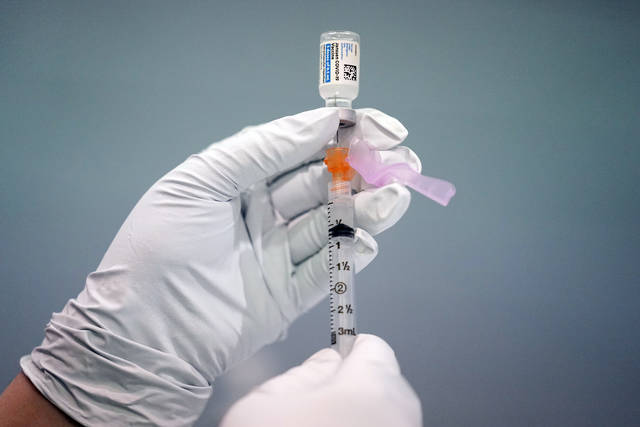https://triblive.com/local/westmoreland/sen-kim-ward-endorses-covid-vaccine-for-return-to-normalcy/
Republican Sen. Kim Ward endorses covid vaccine for return to normalcy

State Senate Majority Leader Kim Ward is encouraging constituents to get the covid-19 vaccine.
The Hempfield Republican, who has been at odds with Democratic leaders over the covid-19 shutdown for the past year, went public with her endorsement in a radio interview with 90.5 WESA, Pittsburgh’s NPR news station.
“It’s going to help us get back to normal,” she said, shortly after Gov. Tom Wolf announced Tuesday he will lift pandemic mitigation measures on Memorial Day and eliminate the mask mandate once 70% of Pennsylvania adults have been vaccinated.
Ward again Wednesday morning reiterated her call for people to get vaccinated in a Zoom call with members of the Westmoreland County Chamber of Commerce in which she lobbied for yes votes for a pair of constitutional amendments designed to limit a governor’s emergency powers.
Ward said she has had two shots of the vaccine and had no ill effects.
“You don’t have to, but I don’t think it’s going to hurt you,” Ward told the chamber.
“Getting the vaccine was a personal choice for me,” she later told the Tribune-Review.
Ward said she believes it reduces the chances of contracting the virus, but she wouldn’t support forced vaccinations.
Ward’s comments came on the heels of a public service video U.S. Rep. John Joyce released this week. In it, the Blair County Republican, a physician and member of the GOP Congressional Doctors Caucus, endorsed the Pfizer, Moderna and Johnson & Johnson vaccines as safe and encouraged residents in his district — which stretches from eastern Westmoreland County to Chambersburg — to get vaccinated.
The GOP Doctors Caucus, a group of congressional doctors, has been urging fellow Republicans to be vaccinated, stressing the value of safely reopening America.
Ward, who sponsored two constitutional amendments to limit the governor’s emergency powers in Pennsylvania, said she welcomed Wolf’s decision to eliminate capacity limits on businesses effective Memorial Day. She joined Senate President Pro Tempore Jake Corman, R-Centre County, in a statement calling it “welcome news for small employers, who have suffered greatly under the Wolf Administration’s unilateral mandates for more than a year.”
But she warned that under the governor’s emergency powers, Wolf still has the authority to change his mind, institute another shutdown and exercise broad unilateral powers to effect change.
By law, the governor has the authority to declare a state of emergency for 90 days and then enact additional extensions. The proposed amendments would limit his authority to 21 days and require that he consult with the Legislature after that initial period.
“Our intent is to just bring back a balance of power,” Ward said.
She said Wolf used the emergency declaration to consolidate his power and refused to answer to anyone about the processes involved in deciding which businesses could remain open, which had to close and how nursing homes would be required to handle patients with the virus.
“We still don’t know who made those decisions or how,” she said.
Republicans have charged that the administration manipulated the wording of the ballot initiatives to make them less likely to pass. “The wording makes it look like (the amendments) take away the balance of power,” Ward told the chamber. “Don’t read it. Just vote ‘yes.’ ”
She stressed that all registered voters can cast ballots on the constitutional amendments in the May 18 primary, regardless of party affiliation or even with no party affiliation.
The amendments will become law if approved by a majority of voters. They are among dozens of initiatives in legislatures across the country designed to limit gubernatorial powers during emergency declarations.
Progress in the state’s vaccine rollout, which began to pick up steam after the governor met with the Legislature’s bipartisan covid-19 task force this spring, showed what can happen when the two branches of government work together, Ward said.
“We were 48th in the country at the beginning of the year, and, with the bipartisan task force, we’re now in the top five. Having a few more seats at the table when you make decisions affecting Pennsylvanians is a good thing,” she said.
Although vaccination rates increased this spring as doses became more widely available and officials opened clinics to all adults, many clinics have reported supply began to overtake demand in late April.
And vaccination rates still are nowhere near the 70% goal President Biden has set for July 4 and that Wolf set as the threshold for lifting his mask mandate.
A recent Monmouth University poll suggested as many as one in five Americans still say they will not get the vaccine, and that vaccine hesitancy appears highest in the kind of rural areas Ward and Joyce represent.
On Wednesday, state health officials said 3.6 million adults in Pennsylvania, or 42.2%, have been fully vaccinated, with another 1.8 million partially vaccinated. There have been 8.8 million doses distributed in Pennsylvania, meaning nearly 51% of the population has received at least one dose.
Locally, Westmoreland County reported 110,891 adults have been fully vaccinated and 44,159 partially vaccinated. To meet the 70% threshold, about 200,000 of the county’s adult residents would have to be fully vaccinated.
In Allegheny County, 445,578 adults were fully vaccinated and 235,040 partially vaccinated. Reaching the 70% mark would require 664,927 adults to be fully vaccinated.
Copyright ©2026— Trib Total Media, LLC (TribLIVE.com)
